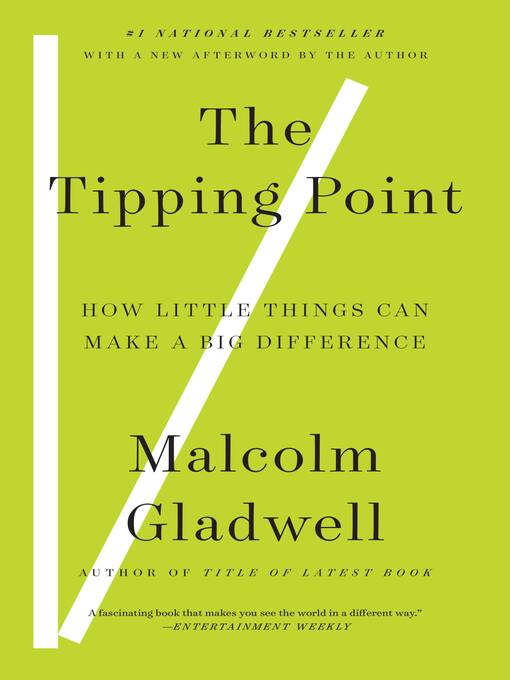
The Tipping Point
How Little Things Can Make a Big Difference
چگونه چیزهای کوچک میتوانند باعث ایجاد یک تفاوت بزرگ شوند.
فرمت کتاب
ebook
تاریخ انتشار
2006
Lexile Score
1160
Reading Level
8
ATOS
9.1
Interest Level
9-12(UG)
نویسنده
Malcolm Gladwellشابک
9780759574731
کتاب های مرتبط
- اطلاعات
- نقد و بررسی
- دیدگاه کاربران
نقد و بررسی

adubov - This book is very intriguing. It talks about how the smallest things could affect the biggest. I really enjoyed this book.

February 28, 2000
The premise of this facile piece of pop sociology has built-in appeal: little changes can have big effects; when small numbers of people start behaving differently, that behavior can ripple outward until a critical mass or "tipping point" is reached, changing the world. Gladwell's thesis that ideas, products, messages and behaviors "spread just like viruses do" remains a metaphor as he follows the growth of "word-of-mouth epidemics" triggered with the help of three pivotal types. These are Connectors, sociable personalities who bring people together; Mavens, who like to pass along knowledge; and Salesmen, adept at persuading the unenlightened. (Paul Revere, for example, was a Maven and a Connector). Gladwell's applications of his "tipping point" concept to current phenomena--such as the drop in violent crime in New York, the rebirth of Hush Puppies suede shoes as a suburban mall favorite, teenage suicide patterns and the efficiency of small work units--may arouse controversy. For example, many parents may be alarmed at his advice on drugs: since teenagers' experimentation with drugs, including cocaine, seldom leads to hardcore use, he contends, "We have to stop fighting this kind of experimentation. We have to accept it and even embrace it." While it offers a smorgasbord of intriguing snippets summarizing research on topics such as conversational patterns, infants' crib talk, judging other people's character, cheating habits in schoolchildren, memory sharing among families or couples, and the dehumanizing effects of prisons, this volume betrays its roots as a series of articles for the New Yorker, where Gladwell is a staff writer: his trendy material feels bloated and insubstantial in book form. Agent, Tina Bennett of Janklow & Nesbit. Major ad/promo.

November 15, 1999
This book, which features the Law of the Few and people called Connectors and Mavens, sounds like pop psychology, but it's written by a New Yorker writer, so there's obviously more to it.
Copyright 1999 Library Journal, LLC Used with permission.

February 15, 2000
Gladwell, a "New Yorker" staff writer, offers an incisive and piquant theory of social dynamics that is bound to provoke a paradigm shift in our understanding of mass behavioral change. Defining such dramatic turnarounds as the abrupt drop in crime on New York's subways, or the unexpected popularity of a novel, as epidemics, Gladwell searches for catalysts that precipitate the "tipping point," or critical mass, that generates those events. What he finds, after analyzing a number of fascinating psychological studies, is that tipping points are attributable to minor alterations in the environment, such as the eradication of graffiti, and the actions of a surprisingly small number of people, who fit the profiles of personality types that he terms connectors, mavens, and salesmen. As he applies his strikingly counterintuitive hypotheses to everything from the "stickiness," or popularity, of certain children's television shows to the spread of sexually transmitted diseases, Gladwell reveals that our cherished belief in the autonomy of the self is based in great part on wishful thinking. ((Reviewed February 15, 2000))(Reprinted with permission of Booklist, copyright 2000, American Library Association.)

























دیدگاه کاربران